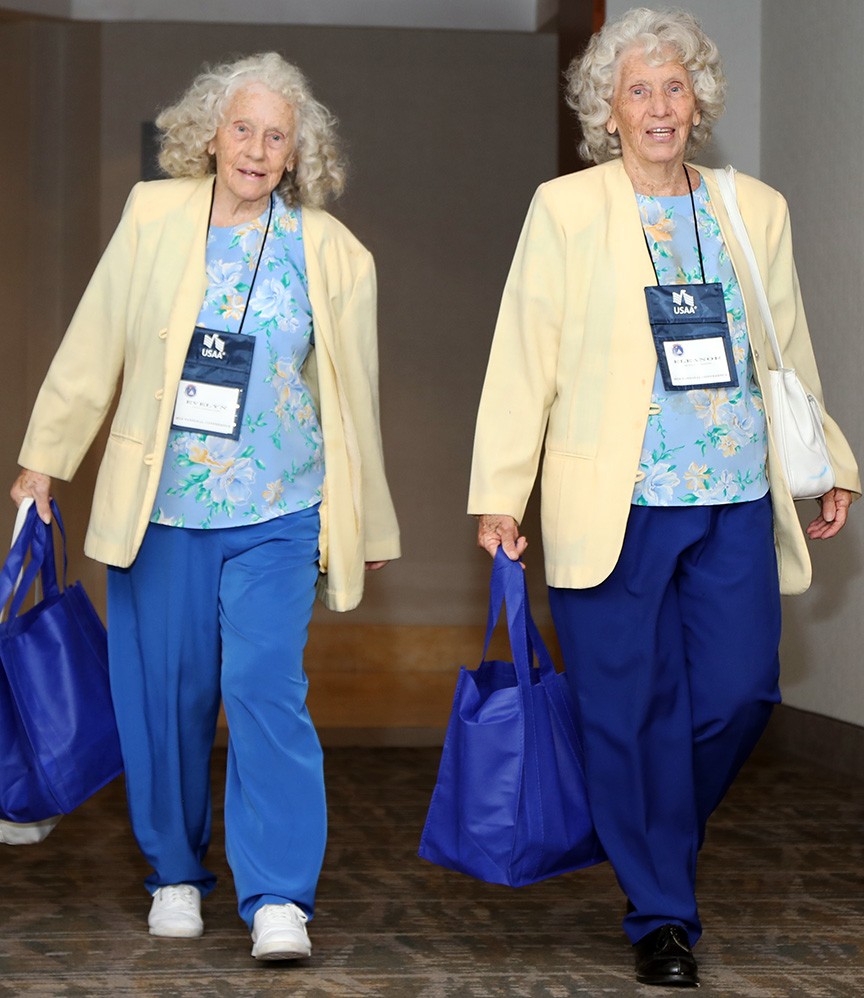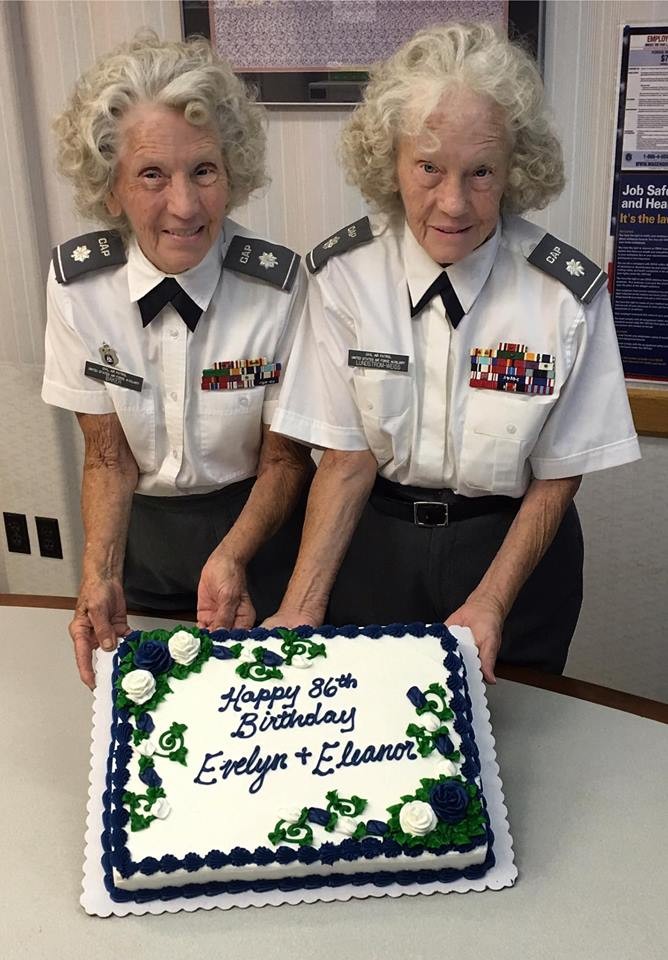Double Vision: Twin Sisters Near 7th Decade in CAP, Wash. Wing
Donna Campbell
Contributing Writer
 Not all national treasures are brick and mortar. One Civil Air Patrol wing can claim a flesh-and-blood pair.
Not all national treasures are brick and mortar. One Civil Air Patrol wing can claim a flesh-and-blood pair.
They are “The Twins” of the Washington Wing: Lt. Cols. Eleanor Baker and her younger sister — by seven minutes — Evelyn Lundstrom-Weiss. The two women, who will celebrate their 88th birthday in September, have volunteered in CAP for nearly seven decades.
As an early birthday gift to each other, the sisters are treating themselves to a few days in Anaheim, California, where they’re attending the CAP 2018 National Conference.
“We figure it’s probably our last conference,” Baker said.
Similar health issues have gradually slowed the identical twins down over the years. Still, at 87 they remain as active as they can. Lundstrom-Weiss assists with historian duties for the wing and Renton Composite Squadron, and Baker’s title holds the title of wing assistant historian.
Col. James P. Furlong, a former Washington Wing commander, said Baker in particular embodies wing history.
“She’s got a small Smithsonian Museum of stuff, including uniforms back from the ‘40s and ‘50s,” Furlong said.
“We just collected so much stuff that we started turning it into the history department,” Lundstrom-Weiss said. “A lot of it was our own stuff, and then other people gave us things.
“We saved all our uniforms. We put them on display periodically,” she said.
The twins were considered celebrities when he came on board as commander, Furlong recalled.
“I came from Georgia about 25 years ago, and they were already a legend when I got here,” he said.
The sisters’ history with CAP started when they attended cadet classes in West Seattle in 1947. They didn’t officially join CAP until 1950, during the brief period they lived in Sacramento, California.
“We were always interested in aviation. We wanted to be airline stewardesses,” Baker said.
But if a woman in the ‘40s wanted a career as a flight attendant, she had to be a nurse as well. The sisters’ father died when they were young, so they weren’t able to continue their education past high school.
They got jobs instead and joined the CAP.
“When we joined, we learned drill. We love marching, both of us. Both of us enjoyed it,” Baker said.
The women were assigned administrative duties at the search base, but they flew as observers often.
Both said they were shy in high school, but their CAP participation helped them become leaders.
“I think it builds character,” she said. “I was so shy when I was in high school, and I think it brought me out of my shell. I can talk to anyone now.”
Baker has taught classes and made presentations, just like her sister.
“I think it’s brought us to being stronger ladies,” she said.
The women lived in Washington state their entire lives except for the year they spent in Sacramento as teenagers. Even now they’re only a few miles apart.
They’ve never lived more than 20 miles away from each other.
Lundstrom-Weiss spent her years at the Boeing Co. as a tool clerk until she retired at 65. Baker was a “Kelly Girl” at Kelly Service, the nationally known temporary staffing company. She worked mostly in office management and bookkeeping.
They married and had children — two sons and a daughter each — but no twins. They became widows and both married again. They’re both widows for a second time.
“She met her first husband in Civil Air Patrol,” Baker said of Lundstrom-Weiss. “I think she told her second husband he had to join Civil Air Patrol because she was always going to be involved in that.”
The sisters witnessed history as CAP’s technology improved over the decades.
Lundstrom-Weiss said they used binoculars when they flew search missions in their early years with CAP. These days high-tech tools, including those used by CAP’s National Cell Phone Forensics and National Radar Analysis teams, prove increasingly invaluable in helping find downed planes.
“When we went out on search missions, at first you just plain looked out of the airplane for a lost hunter or lost airplane. Now it’s lots more electronics,” Lundstrom-Weiss said.
The most noteworthy search mission they’ve been involved with was undertaken after Mount St. Helens’ eruption May 18, 1980. At the incident command post the sisters worked hand-in-hand with representatives of the military services participating in the response — the U.S. Air Force, U.S. Army and National Guard.
They agree CAP’s cadet program hasn’t changed much over the decades — it still aims to develop youngsters into responsible citizens who are educated on the importance of aviation and space and can perform lifesaving, humanitarian missions.
That’s what’s kept them involved in CAP for 70 years.
“We stayed with it because we love Civil Air Patrol and its missions,” Baker said. “Both of us were quite active in the aerospace education program.”
Through CAP, they’ve traveled the U.S. for training and on missions. They’ve attended conferences as both teachers and students. As representatives of the organization they met such celebrities as Ronald Reagan before he was president, actor Dale Robertson, storied pilots Gregory “Pappy” Boyington and Chuck Yeager, and Star Trek’s Nichelle Nichols.
.And in one of the rare instances in their lifetimes when they weren’t together, Lundstrom-Weiss spent two weeks in Hong Kong as part of a foreign exchange program.
For these two sisters, Civil Air Patrol was like family.
“We did everything together. We didn’t even think of doing anything without the other,” Baker said. “We didn’t do much outside of Civil Air Patrol.”
Neither sister drives anymore, but they still attend their CAP meetings thanks to friendly chauffeurs.
“I think that’s what’s kept us so young,” she said. “We’ve never sat at home and did nothing.”
Whether it was planting flowers in their yards, raising families or heading off on search missions, they stayed busy — together.
“We’ve just enjoyed doing all these things with each other,” Lundstrom-Weiss said. “It’s been, pretty much, our life.”
They’ve shared their history with CAP at exhibitions at fairs and aviation shows, talking about CAP to anyone who stopped by their booth, especially young people who could be at the beginning of their own decades-long journey.
“I hope we inspired some of them,” she said.





